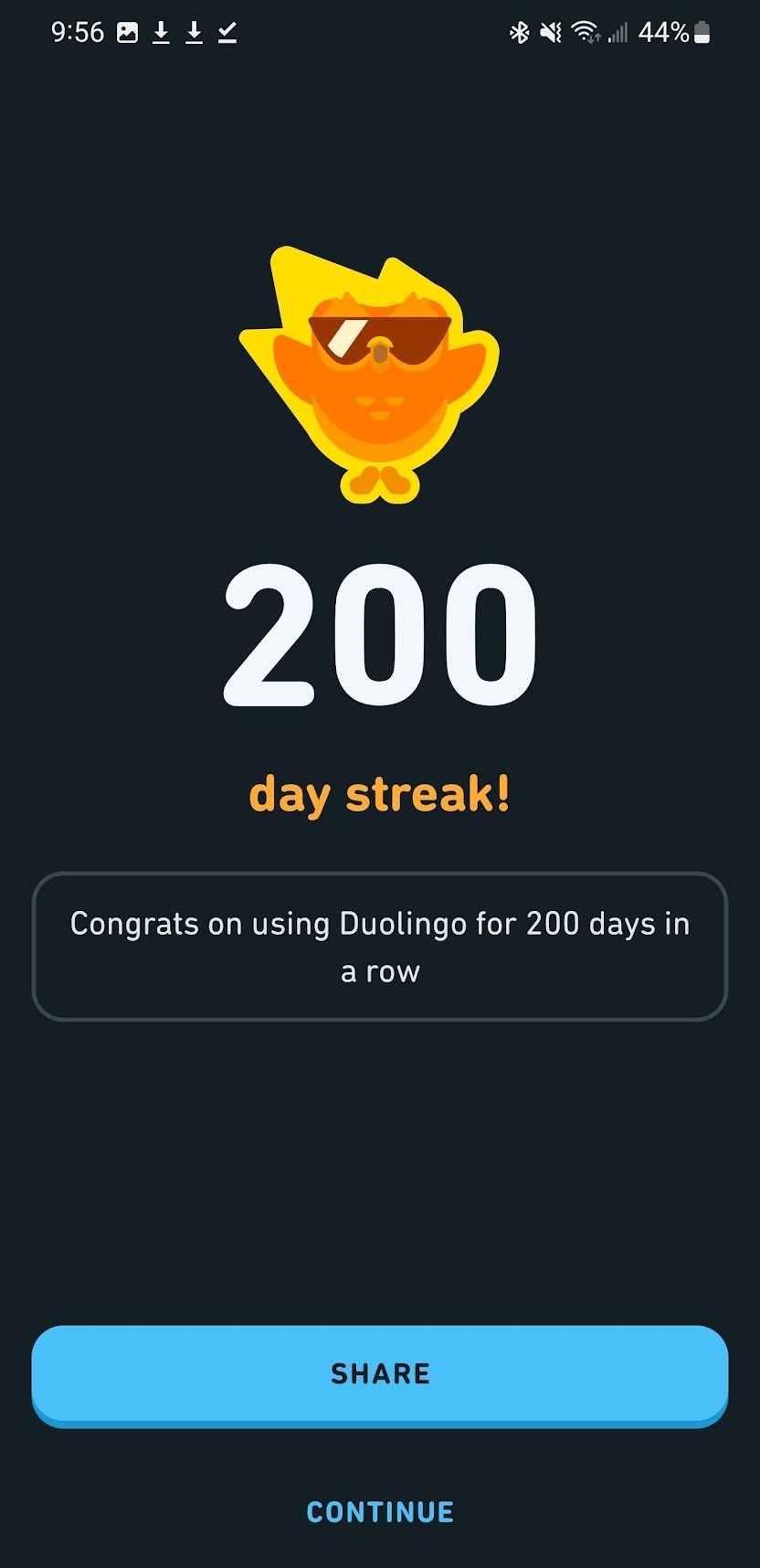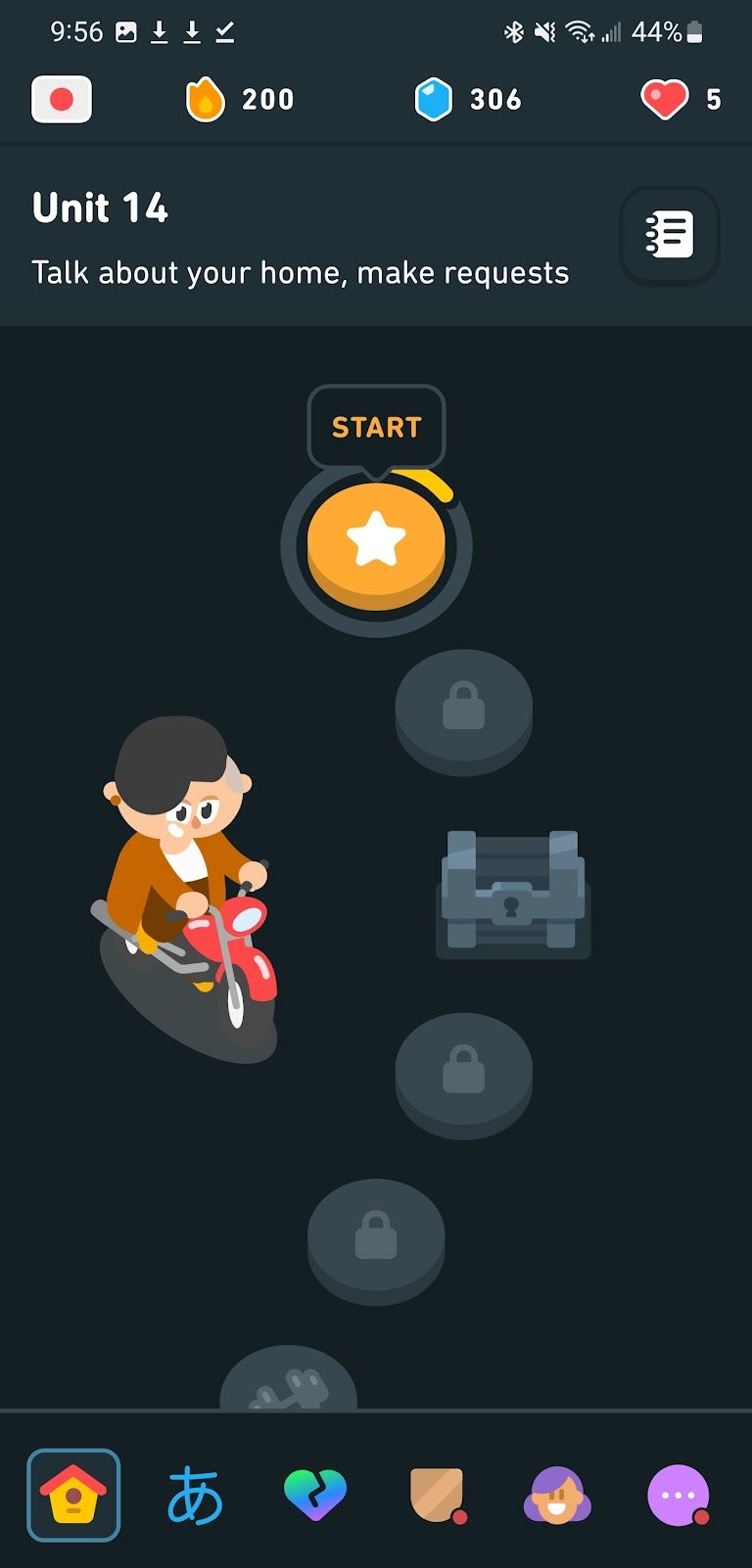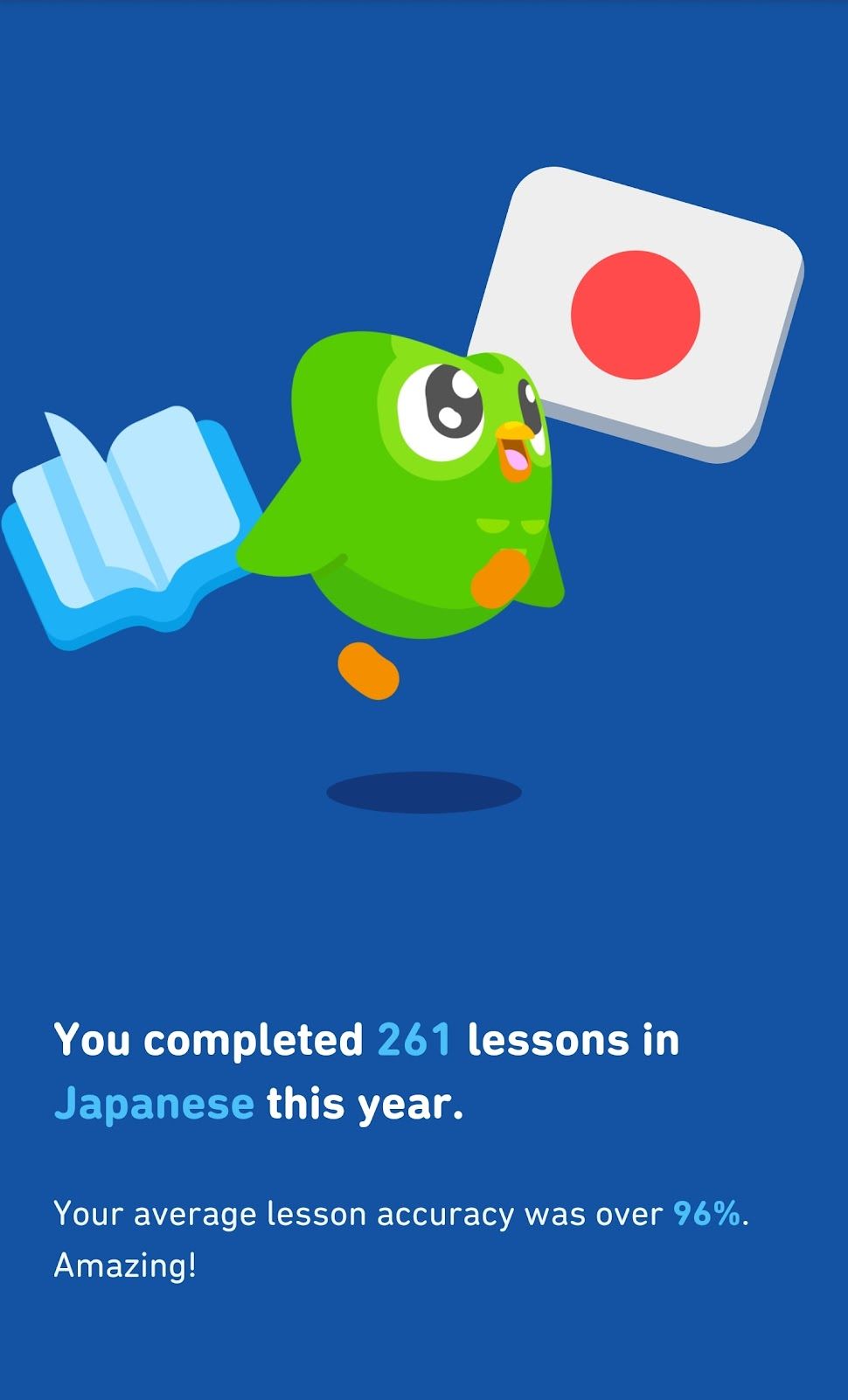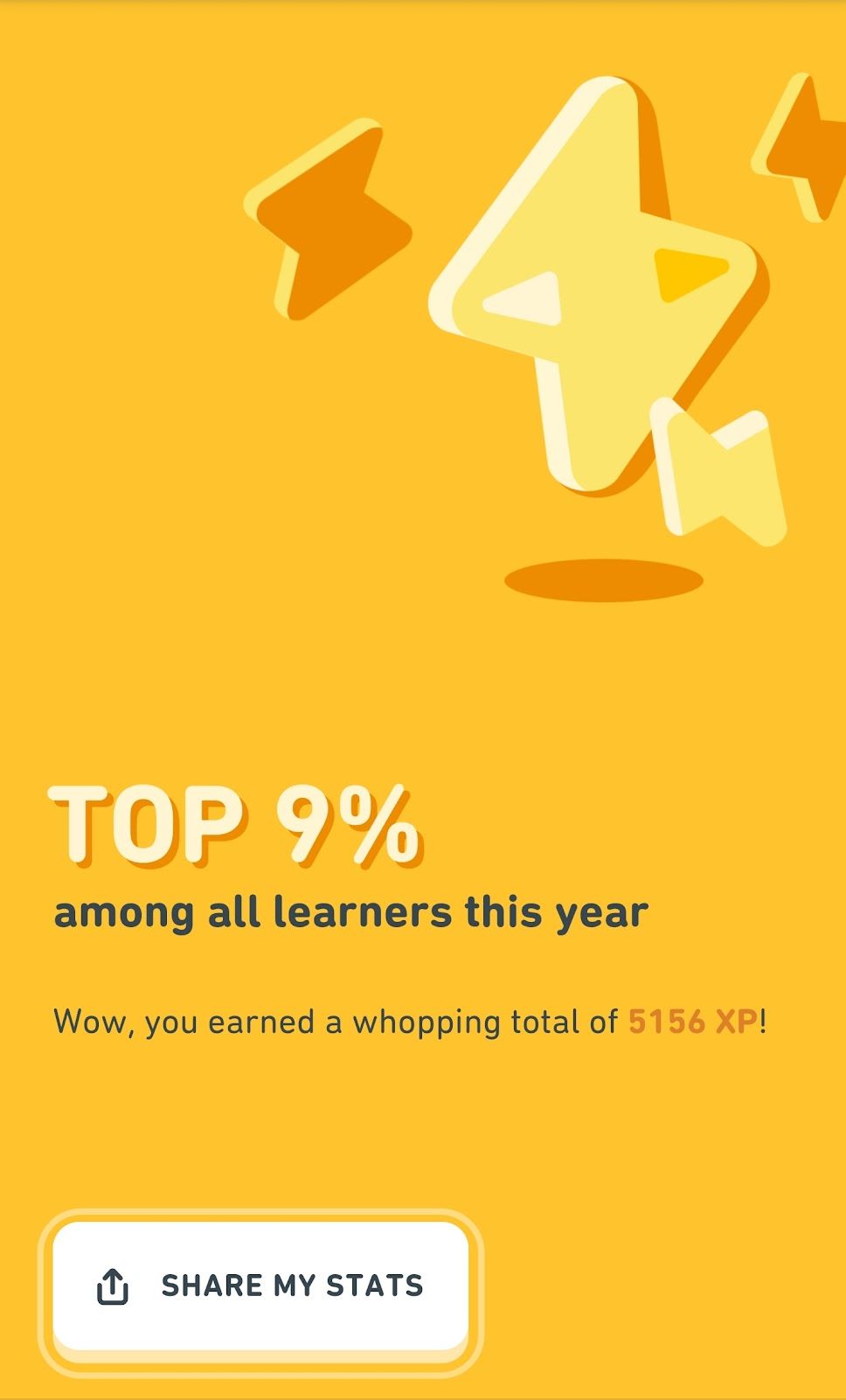200 days of Duolingo
Thoughts on using Duolingo for about 7 months as a supplementary language game for my Japanese language (re)learning.
I started Duolingo in April of this year. I've maintained a pseudo-200-day[1] streak in Japanese, and I'm most of way through Unit 14 of 112 (!). Here are my thoughts so far on the app.
In Duolingo you receive "streak freeze" items (up to 2 at any given time) every so often when you complete exercises. If you miss a day, you can spend a streak freeze to preserve your daily streak count. I've spent at least a dozen or more of these… ↩︎


Context
I started Duolingo at maybe an upper beginner-low intermediate level of Japanese, having initially studied it for 4 years in school about 10 years ago and just in that month of late March-early April picking it back up again. I still remembered how to read hiragana, katakana, and some kanji, as well as some basic vocabulary and grammar.
Why Duolingo
I resisted this app when learning Spanish as an adult a few years ago because I have heard bad things about it, i.e., you're not gonna get fluent with just it, sometimes the sentences are weird, translating into your native language is a waste of time and possibly detrimental[1] (and Duolingo uses this as one of many lesson styles), etc.
I dipped into it for Japanese this year truly out of curiosity and as some tiny, fun way to keep myself accountable each day. If I didn't do anything at all, I should at least do a few minutes of Duolingo, I reasoned. I knew I shouldn't rely on it solely and that I wasn't tricking myself into thinking I'd hit fluency with just ~5 minutes a day of language games.
Why I've stuck with it
The silly reasons I stick with it are that 1) the gamification keeps me attached to preserving my streak, and 2) it's really cute and wholesome. The animations, diversity of characters and stories, the accessibility features -- you can tell the developers embrace inclusivity.
More practically, among other things, the low effort nature of keeping myself accountable has really helped with my motivation. It's gratifying to see this visual progress on a game screen (it really is a game) over many months. Thankfully, I've been consistent with other habits in my language learning most days, but a few times when traveling it was really hard to do anything more than Duolingo and a few anki flashcards. Duolingo has been my constant.
Additionally, I've been able to pick up some new vocabulary and grammar points and reinforce old ones. One point in particular was the abundant practice of positional phrases, like
-
水筒は椅子のそばにあります。(The water bottle is next to / by the chair.)
-
傘はテーブルの上にあります。(The umbrella is on top of the table.)
This was some basic stuff I knew theoretically, but I really needed the additional practice to be comfortable with it.
Occasionally I get some challenge as well, particularly with the short stories and once in a while with certain lesson exercises.
Finally, I appreciate that I can use Duolingo for my needs, (almost[2]) completely for free, without feeling limited or frustrated compared to other freemium apps.
Matt vs Japan, Timothy Moser (whose product I used for Spanish), and other online language learning personalities bash translating into your native language. In my experience, and after having revisited a few textbooks from my Translation Studies course in college, I have come to disagree with them. I think there is a balance to be made. Immersion is so important, but dipping a small percentage of your time into translation more robustly tests and reinforces your understanding of material, especially if it's right at or slightly above your level. ↩︎
I admit that there was one time I spent $5.29 to buy some streak freezes to protect my streak. This was a sad sign of my attachment to my streak… but I figured that I am an advocate for paying for software, as a software engineer myself. $5.29 felt like a reasonable “donation” to this app that’s helped me in my language journey for, so far, the past 7 months. ↩︎


What I do with it
The vast majority of the time I do one lesson or short story a day.
To this day, on average, I probably know 93% of vocabulary and grammar I encounter in Duolingo. Again, waste of my time? Inefficient? But for the 7% I don't know, I make sure to create some flash cards to fill in those gaps. Furthermore, the reinforcement helps me move many knowledge points from my conscious to my subconscious (or something handwavy like that).
Since the new knowledge gain is so small, though, ensuring Duolingo does not take up much of my time is critical.
What I don't do with it
I don't spend more than 10 minutes a day on it. 99% of the time I spend less than 4 minutes. Early on I would try to do at least 15 minutes or so, and that quickly got boring. I try to approach it like the earlier Wordle craze -- limit myself to one puzzle (two if I am super ambitious) a day so I don't get tired of it, but I do maintain some habit. Beyond the tedium, limiting myself is good because I know I can be better spending the rest of my time on higher value activities, like consuming native content, or living my life!
As such, I don't solely rely on it for language learning. For people who really want to get fluent, they should not be lulled into "just 5 minutes a day" being sufficient. For people who just want a wholesome, educational phone game, Duolingo is great.
Who should not use Duolingo
-
People who are trying to cram in some quick Japanese 101 before visiting Japan. While you shouldn't solely rely on Duolingo to get fluent, I think the units are designed to be for someone who wants to achieve general fluency. In other words, it's not immediately optimized for travel vocabulary or sentences you'd use for getting around, ordering food, etc. And yet, I've come across countless folks lamenting about Duolingo for their 12-20-hour flights to Japan not getting relevant language tips. You are better off with something else like Pimsleur or a phrase book.
-
People who think Duolingo should be their sole source for language learning if they want fluency one day. Said this enough times.
-
People who want to use it for free but make a lot of mistakes in their target language at the level where Duolingo tests them. In Duolingo you have 5 "hearts" which are like your hit points or health. You lose one for each mistake you make in whatever lesson you take, though this count resets every new day. If you lose all your hearts, (I think) you can no longer progress in your lessons unless you buy some items to replenish your health. If you find yourself making a lot of mistakes and frequently losing all your hearts, you may get frustrated with the free version of Duolingo, in which case you can consider the premium version.